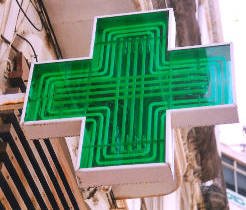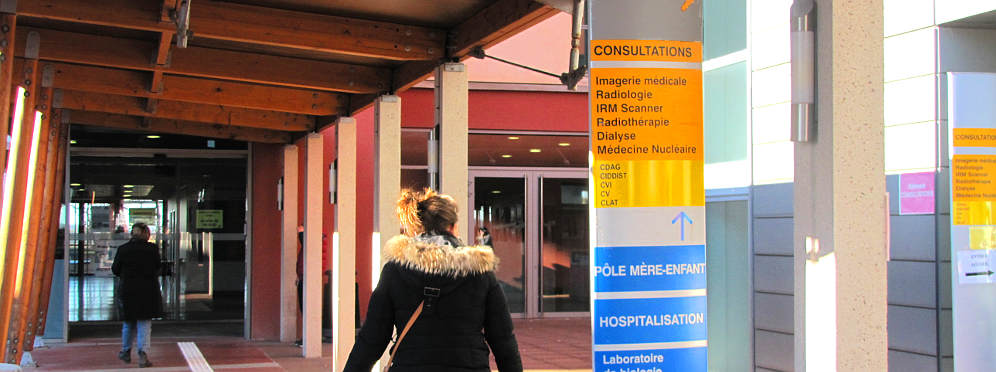- Explore France ►
- Essential pages
- Travel in France
- Where to go
- What to see and do
About-France.com
- the connoisseur's guide to France
This page provides a general overview of the French health care system and how it works. The French health care system, in spite of its problems, is ranked by the World Health Organisation as beingone of the best in the world.
Click
here if you are looking for information on
emergency medical help in France
emergency medical help in France
The
French health care system
and how it works
| Subject index | A&E | Specialist care |
| Primary care | Pharmacies | Hospitals |
Emergency
in Paris:
24 hr chemist / pharmacies:
a) 84, av des Champs-Elysées 75008, tel
0145 62 02 41
b) 6, place Clichy 75009, tel
0148 74 65 18 .
English-speaking pharmacies:
British Pharmacy
62, Avenue des Champs-Elysées
75008 Paris
0143 59 22 52
British-American pharmacy,
1 rue Auber, 75009
0142 65 88 29
English-language crisis line;
SOS-Help
Daily 3 pm - 11pm
01 46 21 46 46
The health care system in France is made up of a fully-integrated network of public hospitals, private hospitals, doctors and other medical service providers. It is a universal service providing health care for every citizen, irrespective of wealth, age or social status.
Funding of health care in France.
The French health care system is funded from four sources:
- Obligatory health contributions levied on earned income, for which it is paid by employers, employees and the self employed
- Obligatory contributions levied on unearned income (investment income, pensions, etc)
- Central government funding
- Users who normally have to pay a small fraction of the cost of most acts of health care that they receive.
The system has been put under considerable strain by the Covid-19 pandemic, but generally speaking has proved its resiliance, and in most parts has been able to carry on as normal in spite of the extra pressures.
In European terms, the French health care system is among the better funded in terms of GDP, and average in terms of GPs, hospital beds and nursing professionals, as the table below shows. Compared specifically to the UK, funding and number of GPs are 10% higher, while there are more than twice as many hospital beds and 40% more nurses and midwives than in the UK.
| Belgium | France | Germany | UK | |
| Health Spending as share of GDP | 10.4% | 10.9% | 10.9% | 9.9% |
| Number of GPs for 1000 population | 3.0 | 3.1 | 4.1 | 2.8 |
| Hospital beds per 1000 population | 6.5 | 6.4 | 8.2 | 2.9 |
| Nurses and midwives per 1000 population | 10.7 | 9.65 | 11.1 | 6.67 |
(figures: Eurostat 2013 or 2014).
In addition, the cost of medicines in France is among the lowest in Europe. A UK Department of Health survey in 2008 of the cost of medicines in the EU and the USA found medicine prices in France about 10% less than in the UK.... and well under half the price of the same medicines purchased in the USA.
How the French health care system works
For usersThe French health care system is relatively simple for its users - that means virtually everyone living and working in France, or dependent on someone living or working in France, and every pensioner.
Primary health care
Primary health care is provided by a network of 23,000 general practitioners (in French, médecins généralistes) (a ratio of 1 GP per 2600 inhabitants). Most GPs are self-employed professionals, and work either on their own, or in group practices. Citizens are free to choose the GP the want, and sign up with him or her, as their personal doctor. Citizens may also consult any other GP they wish, but only the personal doctor with whom they are registered is authorised to refer patients to a specialist or to another health care provider - nurse, physiotherapist, etc - for further care under the health care system.In most cases, patients have to pay a flat rate fee for any visit to a general practitioner. The cost in 2025 is 30 € per visit, irrespective of the time taken, but is higher for visits to surgeries open at night or at weekends, and for home visits. Most of the cost will then be automatically reimbursed to the patient by his state-run health insurance provider, leaving the patient with between zero and 6 Euros to pay for a standard trip to the doctor, depending on the type of health care insurance he has and the age or medical condition of the patient.
Virtually all GPs in France are "conventioned", i.e. they have signed a contract with the national health insurance scheme to provide their services in the framework of the national health service, at the rates agreed nationally.
Accident and emergency
A&E services (les urgences) are part of the national heath care system. All cities and large towns have a service know as the SAMU, which is the emergency ambulance service. Paramedics and medics from the SAMU are called out in the event of accident or emergency, and provide on the spot assistance before transporting the sick or injured to A&E or other specialised units at the nearest hospital providing them.The SAMU ambulance service is only used for accidents and emergencies. Other routine ambulance work is carried out by private ambulance firms, subcontracted to the state health care system.
Specialist health care
Specialist health care is provided by thousands of specialists in all branches of medicine, in towns and cities throughout France. Specialists charge higher fees than general practitioners, but again there are official rates agreed with the national health service, which form the basis on which patients are reimbursed. A large number of specialists apply tariffs that are higher than the official rates; in such cases, patients will either be reimbursed according to the standard rate, or else at a higher rate, if their health insurance provider provides for this.As stated above, visits to specialists in France are only reimbursed by the health care system at the full rate if the patient has been referred to the specialist by his own GP. Citizens may also visit any specialist they want, without getting referred by their own GP; but if they do so, the cost of their specialist visit will only be paid back at the basic GP visit rate, however much they paid.
The main exception to this is for dentists: dental care is covered by the health service, but has its own tariffs and reimbursement rates. Generally speaking, most basic dental work - fillings, extractions etc. - is carried out and paid for under much the same conditions as other specialist health care treatment. Other more complex operations are also reimbursed, but at lower rates.
Many specialists divide their time between consultancy work in their own surgery or group practice, and hospital work. Some work exclusively in their own practice, and some work exclusively in hospitals or clinics. It is important to remember that specialists working outside state hospitals do so as self-employed professionals, offering a private service that is paid for by the patient, and then rapidly reimbursed by the state health insurance scheme.
Medicines, pharmaceuticals
GPs and specialists prescribe medicines and other parapharmaceutical products that must then be obtained by the patient from a pharmacy. It is unusual for GPs, except perhaps on night visits, to have any medicines available with them.
At pharmacies, the pay-and-get-reimbursed principle again applies, with one major difference. Whereas with doctors' visits, the patient pays the full amount due, and then is reimbursed later minus the percentage he has to pay, with pharmaceuticals the patient pays only the part of the cost that is not taken care of by the state health care system.
Thus, for a typical visit to the pharmacy with a prescription for drugs costing, let's say, fifty euros, the patient will be charged between zero and fifteen Euros, depending on the nature of the drugs and material prescribed, and the health insurance cover he has. There are four basic rates of reimbursement for medicines: 100%, 65% (the normal rate) 35% and not-reimbursed. Complementary health insurance plans (known as les mutuelles) will push these rates up considerably.
Hospitals
There are two sorts of hospitals in France; generally speaking these are known as hôpitaux when they are state run, and cliniques when they are privately run. Most private cliniques are state approved, and can therefore work for the national health service. Many specialists work in both state run hospitals and in private clinics: since they are self-employed professionals, they can sell their services to whatever hospital or clinic will pay them.Both GPs and specialists can refer patients for hospital treatment if it is deemed necessary; and within the framework of the health service, they can send them for treatment in either a state-run hospital or a private clinic, whichever they consider to be best for the purpose, or to provide the fastest service.
In the framework of the French health care system, patients are only billed for a very small proportion of the cost of their stay in hospital; the most significant charge that the patient must pay is a 20€ per day hospitalisation fee (2025), basically a contribution to the board and lodging provided by the hospital. In most cases, most or all of the rest of the bill is paid for by the state halth insurance scheme and complementary health programmes.
Administration
The health care system is coordinated centrally by the Ministry of health, and administered by the actors in the service, hospitals, clinics, doctors, other health care providers, pharmacies, ambulance companies, etc.
The transfer of funds through the system between patients,and health care providers is ensured by the National Health Service, the "Sécurité sociale", and often subcontracted to complementary health insurance funds known as Mutuelles. The system is highly computerised, since the introduction over ten years ago of a health insurance smartcard known as the Carte Vitale .
The job of bringing in the obligatory health insurance contributions owed by employers, employees and the self employed, is undertaken by an organisation known as the URSSAF.
Difficulties
Like health insurance schemes everywhere, the French state health insurance program has difficulty making ends meet, and relies increasingly on topups from the general budget of the state. An ageing population and the explosion of health care costs due to increasing expectations and the development of expensive new processes and medicines, have put enormous strains on the system. The rates of reimbursement have been reduced in recent years, and some contributions increased. People complain of the cost, but at the same time very few voices are ever heard in France calling for a reduction in the services provided.
In short, almost everyone in France knows that France has one of the best health services in the world, if not the best, and one that is the envy of many other countries. New solutions will be needed in the years to come to make sure that the system continues to provide this high level of service; but there is more or less total consensus in France that whatever the cost may be, it will be worth it.
In 2026, one major problem that is causing alarm is "medical deserts", rural areas where there are just not enough doctors for the local, often elderly, population. In rural areas in particular, as well as less affluent suburban areas, it may be impossible to sign up with a GP or find a pharmacy, let alone a specialist, without making a journey, often over 25 km in rural areas, to the nearest A&E or city. Incentives to entice newly-qualified doctors to take up jobs in medical desert areas have so far met with little success.
France / USA
People in France, who have lived with their national health service system for all or most of their lives, and know first hand how well it works, have been very perplexed by the passions aroused in the United States by Obamacare. They have even greated difficulty understanding how Americans could elect as Obama's successor Donald Trump, a man who pledged (though failed) to abolish universal health care in the USA. Even the most conservative forces in French life support the national health service and have difficulty understanding why some people in the USA imagine that an obligatory health insurance scheme for all could be a bad thing.
For more on other health care systems, see:
People in France, who have lived with their national health service system for all or most of their lives, and know first hand how well it works, have been very perplexed by the passions aroused in the United States by Obamacare. They have even greated difficulty understanding how Americans could elect as Obama's successor Donald Trump, a man who pledged (though failed) to abolish universal health care in the USA. Even the most conservative forces in French life support the national health service and have difficulty understanding why some people in the USA imagine that an obligatory health insurance scheme for all could be a bad thing.
For more on other health care systems, see:
About-France.com
Home
page - Site search
- Regions
- Maps of France
- Contact

Luminous green sign outside a pharmacy




